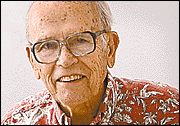Advertisement - Click to support our sponsors.


Hawaii’s World
EVEN one person who dies in misery that could be relieved is one person too many." These are the words of Dr. Brian E. Issell, now researcher and professor of medicine at the Cancer Research Center of the University of Hawaii, formerly its director. Against physician-
assisted deathI couldn't agree more, yet he and I wound up on opposite sides when Governor Cayetano's Blue Ribbon Panel on Living and Dying With Dignity voted 11-7 on physician-assisted death.
Our side has public opinion in its favor. But his has prevailed so far with a foot-dragging Legislature.
Issell agrees with our panel majority that many dying people (my guess is at least hundreds among the 7,000 people who die in Hawaii each year) now die without adequate pain and suffering relief.
His response is to stress better education of doctors and care-givers. Our majority thinks people change too slowly. Not many doctors turned out for Hawaii Medical Association sessions on the topic.
I immensely respect Issell along with all the other members of our panel. He even hopes those of us who favor assisted death will keep pushing. His reason: It stimulates interest in the alternatives he favors -- more use of hospice, better and more widespread pain control, more use of advance directives (living wills), more family discussion before a crisis and the use of surrogates. The governor's panel supported these unanimously.
He agrees we fail in many of these areas today, but thinks legal assisted death is not the way to get around them. His key fear is that ill people will be terminated for economic or convenience reasons.
I'm positive he is very good on comfort care for his patients -- but also sure many other physicians are not. These fail from lack of pain control know-how or fear of being accused of causing a death prematurely. I suspect a very few could have financial motivations -- "I need the income."
Like Dr. Max Botticelli, with our majority group, Issell believes progress will come quickest when we consumers demand more compassionate care. To do a good job of this, we consumers must know our options.
Issell knows from case work that many of us change our minds about final care when the chips are down. A doctor's duty, he says, is to keep current on each patient's wishes.
I gave him a hypothetical problem: Suppose I came to him and said I had Alzheimer's (I don't) and wanted to die before I would deteriorate into a burden on myself and my family.
He would check whether I had a depression he could treat. If not, and if I persisted and told him I was going to refuse food and fluids, whether he liked it or not, and would order no support via tubes ...what then would he do?
Deaths by refusal of liquids and nourishment are quite common, he said, and can be peaceful. He would want to make sure I had an advance directive (living will) and had an appointed surrogate who would support my decision.
Then he would pursue my comfort, including sedation with morphine. He would not cause my death but would keep me comfortable even if it hastened death. Even the Supreme Court condones this course. So does the Catholic church.
Issell's comments are highly reassuring to me. Yet I'd still like to know I could possibly qualify for a fatal potion or injection.
Oregon has shown this is primarily a security blanket. Sixty percent of Oregon voters voted to OK fatal potions yet only a rare few use them. Under stimulus of the death debate, Oregon has developed the best comfort care of any state.
A.A. Smyser is the contributing editor
and former editor of the the Star-Bulletin
His column runs Tuesday and Thursday.